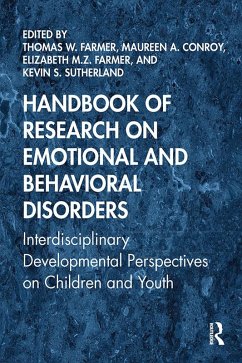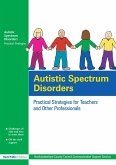Handbook of Research on Emotional and Behavioral Disorders (eBook, PDF)
Interdisciplinary Developmental Perspectives on Children and Youth
Redaktion: Farmer, Thomas W.; Sutherland, Kevin S.; Farmer, Elizabeth M. Z.; Conroy, Maureen A.
105,95 €
105,95 €
inkl. MwSt.
Sofort per Download lieferbar

53 °P sammeln
105,95 €
Als Download kaufen

105,95 €
inkl. MwSt.
Sofort per Download lieferbar

53 °P sammeln
Jetzt verschenken
Alle Infos zum eBook verschenken
105,95 €
inkl. MwSt.
Sofort per Download lieferbar
Alle Infos zum eBook verschenken

53 °P sammeln
Handbook of Research on Emotional and Behavioral Disorders (eBook, PDF)
Interdisciplinary Developmental Perspectives on Children and Youth
Redaktion: Farmer, Thomas W.; Sutherland, Kevin S.; Farmer, Elizabeth M. Z.; Conroy, Maureen A.
- Format: PDF
- Merkliste
- Auf die Merkliste
- Bewerten Bewerten
- Teilen
- Produkt teilen
- Produkterinnerung
- Produkterinnerung

Bitte loggen Sie sich zunächst in Ihr Kundenkonto ein oder registrieren Sie sich bei
bücher.de, um das eBook-Abo tolino select nutzen zu können.
Hier können Sie sich einloggen
Hier können Sie sich einloggen
Sie sind bereits eingeloggt. Klicken Sie auf 2. tolino select Abo, um fortzufahren.

Bitte loggen Sie sich zunächst in Ihr Kundenkonto ein oder registrieren Sie sich bei bücher.de, um das eBook-Abo tolino select nutzen zu können.
The Handbook of Research on Emotional and Behavioral Disorders explores the factors necessary for successful implementation of interventions that foster productive relationships and ecologies to establish, reinforce, and sustain adaptive patterns of emotional and behavioral functioning across childhood and into adulthood.
- Geräte: PC
- ohne Kopierschutz
- eBook Hilfe
- Größe: 11.54MB
Andere Kunden interessierten sich auch für
![Handbook of Research on Emotional and Behavioral Disorders (eBook, ePUB) Handbook of Research on Emotional and Behavioral Disorders (eBook, ePUB)]() Handbook of Research on Emotional and Behavioral Disorders (eBook, ePUB)105,95 €
Handbook of Research on Emotional and Behavioral Disorders (eBook, ePUB)105,95 €![Handbook of Special Education Research, Volume II (eBook, PDF) Handbook of Special Education Research, Volume II (eBook, PDF)]() Handbook of Special Education Research, Volume II (eBook, PDF)121,95 €
Handbook of Special Education Research, Volume II (eBook, PDF)121,95 €![Educating Special Students (eBook, PDF) Educating Special Students (eBook, PDF)]() Michael FarrellEducating Special Students (eBook, PDF)43,95 €
Michael FarrellEducating Special Students (eBook, PDF)43,95 €![Autism Spectrum Disorders (eBook, PDF) Autism Spectrum Disorders (eBook, PDF)]() Autism Spectrum Disorders (eBook, PDF)63,95 €
Autism Spectrum Disorders (eBook, PDF)63,95 €![The Routledge International Handbook of Dyslexia in Education (eBook, PDF) The Routledge International Handbook of Dyslexia in Education (eBook, PDF)]() The Routledge International Handbook of Dyslexia in Education (eBook, PDF)45,95 €
The Routledge International Handbook of Dyslexia in Education (eBook, PDF)45,95 €![What Really Works in Special and Inclusive Education (eBook, PDF) What Really Works in Special and Inclusive Education (eBook, PDF)]() David MitchellWhat Really Works in Special and Inclusive Education (eBook, PDF)39,95 €
David MitchellWhat Really Works in Special and Inclusive Education (eBook, PDF)39,95 €![Autistic Spectrum Disorders (eBook, PDF) Autistic Spectrum Disorders (eBook, PDF)]() Uk Northumberland County Council Communication Support ServicesAutistic Spectrum Disorders (eBook, PDF)40,95 €
Uk Northumberland County Council Communication Support ServicesAutistic Spectrum Disorders (eBook, PDF)40,95 €-
-
-
The Handbook of Research on Emotional and Behavioral Disorders explores the factors necessary for successful implementation of interventions that foster productive relationships and ecologies to establish, reinforce, and sustain adaptive patterns of emotional and behavioral functioning across childhood and into adulthood.
Dieser Download kann aus rechtlichen Gründen nur mit Rechnungsadresse in A, B, BG, CY, CZ, D, DK, EW, E, FIN, F, GR, HR, H, IRL, I, LT, L, LR, M, NL, PL, P, R, S, SLO, SK ausgeliefert werden.
Produktdetails
- Produktdetails
- Verlag: Taylor & Francis eBooks
- Seitenzahl: 512
- Erscheinungstermin: 26. März 2020
- Englisch
- ISBN-13: 9780429841705
- Artikelnr.: 58929458
- Verlag: Taylor & Francis eBooks
- Seitenzahl: 512
- Erscheinungstermin: 26. März 2020
- Englisch
- ISBN-13: 9780429841705
- Artikelnr.: 58929458
- Herstellerkennzeichnung Die Herstellerinformationen sind derzeit nicht verfügbar.
Thomas W. Farmer is Professor and Chair of the Department of Psychology in Education at the University of Pittsburgh. Maureen Conroy is Co-Director of the Anita Zucker Center for Excellence in Early Childhood Studies, and the Anita Zucker Endowed Professor of Early Childhood Studies at the University of Florida. Elizabeth M.Z. Farmer is Professor and Dean of the School of Social Work at the University of Pittsburgh. Kevin Sutherland is Professor of Counseling and Special Education at Virginia Commonwealth University.
Section 1: Developmental Processes and Timing 1. The Development, Prevention, and Treatment of Emotional and Behavioral Disorders: An Interdisciplinary Developmental Systems Perspective 2. Epidemiology of Emotional and Behavioral Disorders 3. Prevention and Intervention in Preschool and Early Elementary School Years 4. Developmental Processes and Emotional and Behavioral Disorders during the Middle and High School Years 5. The Transition to Adulthood: A Critical Developmental Period within a Changing Social-Contextual Landscape Section 2: Targeting Social Processes and Environmental Ecologies 6. Interaction-Centered Model of Language and Behavioral Development 7. Peer to Peer Support: Innovative Strategies for Families of Youth with Emotional/Behavioral Disorders 8. The Family Check-Up: Building on Family Strengths to Promote Child Wellbeing 9. Classroom Peer Ecologies and Cultures, and Students with EBD: Social Dynamics as Setting Events for Intervention 10. Violence Prevention 11. Interventions for Youth Who Experience Trauma and Adversity 12. Strengthening Social Processes to Support Youth with Emotional and Behavioral Difficulties: An Ecological, Public Health Approach in Afterschool Programs Section 3: Selected Effective Programs and Practices 13. The Family Check-Up for Elementary and Middle School Youth and Families Emotional/Behavioral Disorders 14. Multi-Tiered Systems of Support 15. BEST in CLASS: A Tier-2 Program for Children with and At-Risk for Emotional/Behavioral Disorders 16. An Adaptive, Correlated Constraints Model of Classroom Management: The Behavioral, Academic, and Social Engagement (BASE) Program 17. Multi-tiered Social-Emotional Learning: PATHS and Friendship Group in the Fast Track Program 18. Checking the Connections between Effective Interventions for Students with Emotional/Behavioral Disorders 19. Multisystemic Therapy for High-Risk Youth 20. Treatment Foster Care: Providing Out-of-Home Treatment in Community- and Family-Based Environments 21. Residential Programs: Opportunities and Challenges in the 21st Century Treatment Environment 22. Managing and Adapting Practice 23. Best Practices for Prescribing and Deprescribing Psychotropic Medications for Children and Youth 24. The Homework, Organization, and Planning Skills (HOPS) Intervention 25. The Daily Report Card Intervention: Summary of the Science and Factors Affecting Implementation 26. Cognitive-Behavioral Prevention and Intervention Approaches to Student Emotional and Behavioral Functioning 27. School-based Mental Health Section 4: Preparing and Supporting the EBD Workforce 28. Leveraging Implementation Science and Practice to Support the Delivery of Evidence-Based Practices in Services for Youth with Emotional and Behavioral Disorders 29. Preparing Diverse Professionals 30. Leading the Team for Youth with Emotional and Behavioral Disorders: Special Educators as Intervention Specialists 31. Professional Development to Support Service Providers of Children and Adolescents with or At-risk of Emotional and Behavioral Disorders: Issues and Innovations
Section 1: Developmental Processes and Timing 1. The Development, Prevention, and Treatment of Emotional and Behavioral Disorders: An Interdisciplinary Developmental Systems Perspective 2. Epidemiology of Emotional and Behavioral Disorders 3. Prevention and Intervention in Preschool and Early Elementary School Years 4. Developmental Processes and Emotional and Behavioral Disorders during the Middle and High School Years 5. The Transition to Adulthood: A Critical Developmental Period within a Changing Social-Contextual Landscape Section 2: Targeting Social Processes and Environmental Ecologies 6. Interaction-Centered Model of Language and Behavioral Development 7. Peer to Peer Support: Innovative Strategies for Families of Youth with Emotional/Behavioral Disorders 8. The Family Check-Up: Building on Family Strengths to Promote Child Wellbeing 9. Classroom Peer Ecologies and Cultures, and Students with EBD: Social Dynamics as Setting Events for Intervention 10. Violence Prevention 11. Interventions for Youth Who Experience Trauma and Adversity 12. Strengthening Social Processes to Support Youth with Emotional and Behavioral Difficulties: An Ecological, Public Health Approach in Afterschool Programs Section 3: Selected Effective Programs and Practices 13. The Family Check-Up for Elementary and Middle School Youth and Families Emotional/Behavioral Disorders 14. Multi-Tiered Systems of Support 15. BEST in CLASS: A Tier-2 Program for Children with and At-Risk for Emotional/Behavioral Disorders 16. An Adaptive, Correlated Constraints Model of Classroom Management: The Behavioral, Academic, and Social Engagement (BASE) Program 17. Multi-tiered Social-Emotional Learning: PATHS and Friendship Group in the Fast Track Program 18. Checking the Connections between Effective Interventions for Students with Emotional/Behavioral Disorders 19. Multisystemic Therapy for High-Risk Youth 20. Treatment Foster Care: Providing Out-of-Home Treatment in Community- and Family-Based Environments 21. Residential Programs: Opportunities and Challenges in the 21st Century Treatment Environment 22. Managing and Adapting Practice 23. Best Practices for Prescribing and Deprescribing Psychotropic Medications for Children and Youth 24. The Homework, Organization, and Planning Skills (HOPS) Intervention 25. The Daily Report Card Intervention: Summary of the Science and Factors Affecting Implementation 26. Cognitive-Behavioral Prevention and Intervention Approaches to Student Emotional and Behavioral Functioning 27. School-based Mental Health Section 4: Preparing and Supporting the EBD Workforce 28. Leveraging Implementation Science and Practice to Support the Delivery of Evidence-Based Practices in Services for Youth with Emotional and Behavioral Disorders 29. Preparing Diverse Professionals 30. Leading the Team for Youth with Emotional and Behavioral Disorders: Special Educators as Intervention Specialists 31. Professional Development to Support Service Providers of Children and Adolescents with or At-risk of Emotional and Behavioral Disorders: Issues and Innovations







